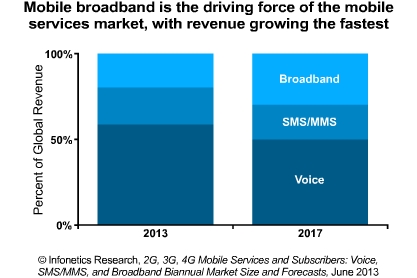Infonetics Research says telecom voice will account for around 50 percent of mobile service revenue in 2017. This reflects Capex plans of Indian operators such as Airtel, Idea Cellular, Vodafone, Reliance Communications, etc.
For instance, top telecom operators in India is still looking at investing substantially in 2G infrastructure and rural expansion. Their investment in 3G and 4G networks in relatively lower than 2G that is primarily used for voice services.
In a research note on July 1, Infonetics said though more subscribers are migrating from voice-only plans to data-centric packages, voice services are still expected to account for almost half of total mobile service revenue in 2017.
LTE growth
LTE broadband is growing the fastest of any mobile services category, with compound annual growth rate of 55 percent for 2012–2017.
Global mobile LTE broadband subscribers to near 570 million by 2017, with most concentrated in North America and Asia Pacific.
The research report does not have country specific data.
LTE phone growth
Meanwhile, IDC says shipments of LTE-capable smartphones are expected to grow by more than 400 percent in 2013.
Earlier this year, Maxis Malaysia launched LTE / 4G services, providing up to 5 to 10 times faster download speeds than its 3G data services, while other operators such as Celcom and DiGi have announced their intentions to rollout LTE plans in 2013.
IDC expects competition in the 4G space to intensify and demand for LTE-enabled smartphones to significantly increase towards the second half of 2013, when LTE networks from all three major mobile operators are expected to be up and running.
Broadband hurdles
According to ITU, countries with a national broadband plan have fixed broadband penetration some 8.7 percent higher on average than countries without plans.
ITU says once the potential impact of factors like higher average income per capita, market concentration and urbanization are discounted, research suggests that countries with plans benefit from fixed broadband penetration on average 2.5 percent higher than countries without plans – a significant margin of advantage in an increasingly interconnected global economy.
Global voice business
In 2012, global mobile service revenue – including voice, SMS/MMS and broadband – totaled $739 billion, up 2.5 percent from 2011, Infonetics said on Monday.
Mobile data (text messaging, mobile broadband) service revenue rose in all major world regions in 2012, boosted by an increase in smartphone usage.
“Overall, the wireless industry remains resilient and continues to perform above expectations during a period of global economic malaise and increasing mobile saturation,” said Stephane Teral, principal analyst for mobile infrastructure and carrier economics at Infonetics Research.
Except in Europe, where unabated economic turmoil continues to take a toll as consumers set less and less money aside for mobile products and services, weighing on Europe’s BIG 5 – Vodafone, Telefónica, Deutsche Telekom, France Télécom and Telecom Italia.
In fact, local regulatory conditions and high mobile penetration rates are the key factors affecting mobile service revenue rather than economic conditions.
Baburajan K
[email protected]






